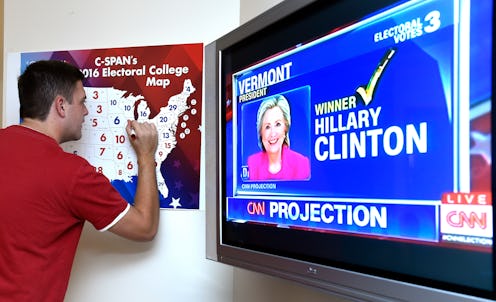News
Christopher Suprun Can't Fix Our Democracy
Quick, name an elector in your state. There are at least three, even if you live in one of America's seven smallest states (or Washington D.C.), and as many as 55 if you live in California. If you can name one elector, chances are it's Christopher Suprun, a Texas Republican elector. In an op-ed in The New York Times Suprun announced he would not vote for Donald Trump, despite Trump having won Texas by 9 points. He wrote in the op-ed that, in accordance with a plan by activists, he will vote for Ohio Republican Governor John Kasich.
Some people who voted against Trump have praised Suprun's decision (while, of course, many Trump supporters have denounced it). For those who are shocked and afraid by Trump becoming president, electors following Suprun's lead seems like hope in the face of a potentially terrible presidency.
But while many of the things Suprun brings up against Trump — his lack of foreign policy experience, his demagoguery and denunciation of protest against him, and the high potential for corruption in Trump's administration considering the many reported concerns about potential business conflicts of interest — could certainly be worthy reasons to prevent Trump from becoming president, it's worth thinking about what it would mean for the Electoral College to choose the new president by rejecting what the voters of their specific states decided.
When people voted on Nov. 8, the ballots included the names of presidential candidates, even if they were technically voting for electors. Americans did not research the identities of electors in their states, trusting them to faithfully execute what their state decided when the electorate voted.
Suprun seems like a model American citizen — a first responder at 9/11, who now works as a paramedic in Dallas. But there's nothing to ensure that the 538 members of the Electoral College are exclusively the best of us, the ones in whom we must trust to decide our government. They are people whose power, in our modern elections, derives not from the people but from antiquated election rules that have remained in place even as political norms have changed. We know not whether these people are making their decisions for high-minded reasons, or for personal grudges, or if they've given any thought to it at all.
If the conscientious electors movement had their way and Kasich became president instead of Trump, it would mean that the president is someone who is not elected by the voters. Even if Kasich were a far better president than Trump, he'd be a change from what we've all assumed about the role of the president — that the president represents the will of the people.
Suprun's op-ed is a powerful statement. And the possibility of more electors voting against Trump than ever before would be a powerful protest and sign that Trump does not represent a normal continuation of American politics. But I still want to believe in American democracy, that the president should be chosen by the people, even if the people make bad choices. While I feel the Electoral College uses a pretty roundabout way of letting the people choose presidents (Hillary Clinton's 2.5 million popular vote lead certainly suggests so), encouraging electors to go rogue is not a long-term or appropriate fix for our democracy.
